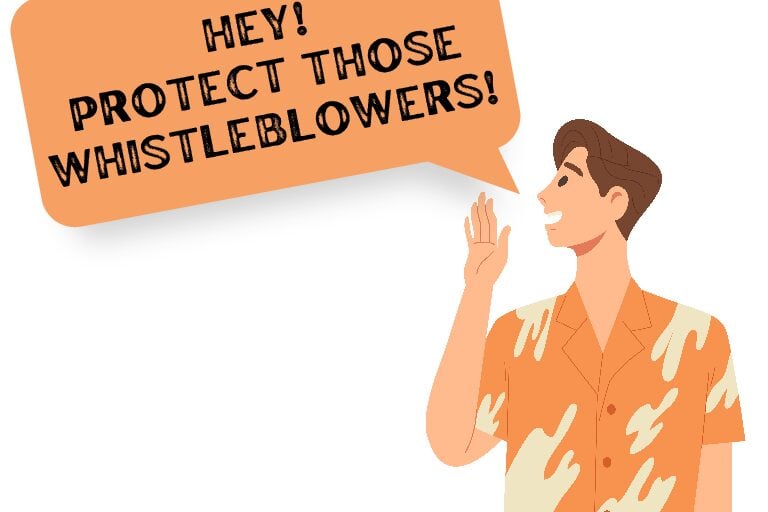“Australia is now 39th in Reporters Sans Frontiers’ World Press Freedom Index, a staggering decline of 20 places since 2018. This reflects a fact acknowledged by both the Morrison and Albanese governments: Australia has a press freedom problem.“d
Associate Professors, Rebecca Ananian-Welsh and Jason Boslan
“As a general proposition, journalists should never face the prospect of jail just for doing their jobs.”
Attorney-General, Mark Dreyfus
A patchwork of complex laws, the failure of government and corporate agencies to respond to complaints and hundreds national security provisions have landed whistle-blowers in court. There are 875 secrecy offences currently on Commonwealth books, for everything from national security legislation to tax law. Some whistle-blowers have gone to jail and it’s little wonder that few whistle-blowers now report corrupt conduct.
What should be done:
- An independent whistle-blower protection commission to:
- oversee and enforce federal whistle-blowing laws
- provide practical assistance to whistle-blowers
- determine what if any intelligence information cannot be revealed
- Stand-alone whistle-blower protection laws, consistent in each state and territory and harmonised across public and private sectors.
- A media freedom framework that protects journalists’ sources and reverses the burden of proof when it comes to publishing government secrets in the public interest
- Stronger, simpler protections for those who make disclosures to the media and members of parliament.
- A positive duty for employers to protect whistle-blowers
- Improved remedies for whistle-blowers who suffer detriment and compensation rights
- Confidentiality requirements to make it easier for agencies, employers and oversight bodies to properly respond to whistle-blowing cases.
- A Public Interest Advocate and only senior judges to have the power to grant warrants relating to journalists and media organisations.
The story so far:
Too often the public right to know is put aside by government to keep embarrassing secrets such as the case of illegal bugging of the Timor-Leste parliament.
Former Defence lawyer David McBride was convicted for his role in the ABC’s landmark Afghan Files reporting, and former public servant, Richard Boyle, is charged with disclosing unethical debt recovery practices in the Tax Office even though both first raised the alarm internally and there is no doubting the substance of their complaints. Boyle’s home was raided in the early hours of the morning by the ATO and Federal Police.
To date eight journalists have been convicted or jailed for refusing to reveal their sources to courts. Since 2011 judges have the discretion to order that a journalist is not required to answer questions that might reveal a source but this is small comfort.
In 2019 the Sydney offices of the ABC and the Canberra home of then News Corp journalist Annika Smethurst were raided by the AFP based on leaked classified information.
ABC journalists Dan Oakes and Sam Clark published allegations in 2017 of unlawful killings by Australian special forces in Afghanistan. Smethurst reported in 2018 on plans to give the nation’s spy agencies greater surveillance powers. The prospect of prosecution hung over them for many months before the charges were finally dropped.
It’s hardly better in the corporate sector where Jeff Morris exposed rampant misconduct inside the Commonwealth Bank, warning whistle-blowers not to put their faith in current whistle-blower protections.
The ALP went to the 2019 Federal election stating that if elected, they would introduce a single Whistleblower Act, a Whistleblower Protection Authority, and consider implementing rewards for whistle-blowers. Four years on and there is little progress.
Read on for who does it better:
Under US law, a blanket protection exists to prevent state access to journalistic materials, subject to strictly limited exemptions.
In New Zealand, as in Queensland and Victoria, a journalist cannot be forced to show police materials that would identify a confidential source (unless a judge determines the public interest in the administration of justice outweighs the public interests in source confidentiality and press freedom).
In Canada, only a senior judge may grant police access to information a journalist holds – and only where there is no alternative and access is justified by a robust public interest test.
The most compelling framework is presented by the UK Police and Criminal Evidence Act, which New Zealand is on the cusp of embracing.
UK police cannot get a warrant to see any journalistic materials such as recordings or documents (unless it is necessary to avoid seriously prejudicing an investigation).
Instead, UK law sets up a special process by which police apply for “production orders”, which the media gets a chance to contest.
Access to journalistic material will only be granted if other methods of getting the material have been tried (or would be futile) and if access is in the public interest.
In recognition of journalists’ ethical obligations to protect their confidential sources, police access to confidential journalistic materials is limited to terrorism investigations. Even then, strict limitations and protections apply.
These considerations are not taken lightly. UK courts have emphasised the high bar police must reach to obtain a production order, and the importance of rights to privacy and press freedom.
References:

